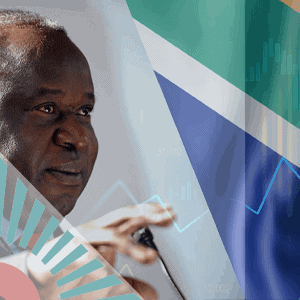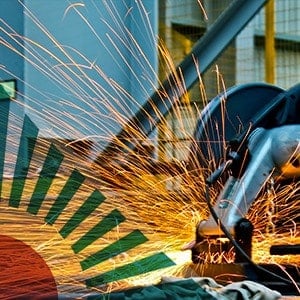Persistent Dip In PMI Concerns SEIFSA
Johannesburg, 2 March 2020 - The Steel and Engineering Industries Federation of Southern Africa (SEIFSA) notes, with concern, the decrease in the seasonally-adjusted Absa Purchasing Managers’ Index (PMI) for the month of February 2020.
Speaking after the release of the data this morning, SEIFSA Economist Marique Kruger said the performance of the index is discouraging and has the potential to impact negatively on the production of companies in both the metals and engineering industry and the broader manufacturing sector.
The composite PMI data for February shows a consecutive deterioration in the level of industrial activity for local businesses, recording 44.3 points compared to 45.2 points in January 2020. Worryingly, Ms Kruger said the latest seasonally-adjusted preliminary data perpetuates a declining trend in the composite PMI in recent months, whereby lower index points were recorded in the preceding months of November 2019, December 2019 and January 2020.
“Generally, the headline PMI and its five sub-indices play an important role in business decision-making processes and the uninspiring performance is worrisome. Specifically, it is disconcerting to note that the majority of the sub-indices deteriorated in February 2020, when compared to January 2020, with the potential for the worrisome trend to continue,” she said.
Nevertheless, the best performing sub-index was the supplier’s performance sub-index, which improved to 58.6 points in February 2020, from 50.8 points in January 2020, while the worst performing one was the new sales orders sub-index, registering 31.2 points in February 2020, from 42.5 points in January 2020.
“Evidently, there is still a long way to go in restoring business confidence in a generally difficult economic environment, underpinned by volatile petrol prices, rising energy and logistics costs as well as uncertain production processes,” Ms Kruger concluded.
SEIFSA is a National Federation representing 21 independent employer Associations in the metals and engineering industries, with a combined membership of 1600 companies employing around 200 000 employees. The Federation was formed in 1943 and its member companies range from giant steel-making corporations to micro-enterprises employing fewer than 50 people.
Rebound In Selling Price Inflation Data Is Encouraging, Says SEIFSA
Johannesburg, 27 February 2020 - The Steel and Engineering Industries Federation of Southern Africa (SEIFSA) welcomes the latest Producers Price Index (PPI) data, which shows an uptick in selling prices for primarily intermediate goods of the metals and engineering (M&E) sector, Economist Marique Kruger said.
The data, released by Statistics South Africa this morning, shows a rebound in the PPI for intermediate manufactured goods from -1.5 percent in December 2019 to 0.7 percent in January 2020. The increase is consistent with the annual change in the PPI for final manufactured goods, which increased to 4.6 percent in January 2020, from 3.4 percent in December 2019.
Speaking after the release of the data, Ms Kruger said that given the volatile historical trend of the PPI owing to factors affecting supply, the latest manufactured goods data is encouraging.
“Producers prefer stability in the data which enables forward planning in a difficult business climate, underpinned by difficulty in passing on price increases onto the market. Moreover, the volatility in selling prices compels manufacturers to absorb unusual spikes in input and material prices in order to stabilise selling prices and keep loyal clienteles,” she said.
Ms Kruger said that generally, the latest data is good for businesses which are provided with an opportunity to perk-up margins and leverage cost-push inflation, also enabling their sustainability. This, she said, would provide impetus for growth in the M&E sector, as well as the broader manufacturing industry and the economy.
SEIFSA is a National Federation representing 21 independent employer Associations in the metals and engineering industries, with a combined membership of 1600 companies employing around 200 000 employees. The Federation was formed in 1943 and its member companies range from giant steel-making corporations to micro-enterprises employing fewer than 50 people.
SEIFSA Welcomes Finance Minister’s 2020 Budget Speech
Johannesburg, 26 February 2020 - The Steel and Engineering Industries Federation of Southern Africa (SEIFSA) welcomes Finance Minister Tito Mboweni’s budget speech, which outlined seven guiding plans towards a turnaround economic strategy for South Africa, SEIFSA Chief Economist Michael Ade said.
Dr Ade identified the seven plans as strengthening macroeconomic policy to improve on certainty, transparency and lower borrowing costs, restructuring State-Owned Enterprises (SOEs), opening markets to trade on the continent, implementing the re-imagined industrial strategy, lowering the cost of doing business, leveraging the private sector as far as possible and implementing a sound macroeconomic framework for enhanced growth.
He said the budget continued on the trajectory set last year by indicating that fiscal sustainability will form the basis of economic recovery and growth this year, with a number of steps announced to achieve a net downward adjustment to the main budget non-interest expenditure of R156.1 billion over the next three years, relative to the 2019 budget projection.
Dr Ade said the public transport spending adjustment by R13.2 billion and the R5,2 billion and R3,9 billion respective adjustments in education infrastructure and health allocation were unfortunate but understandable. He said these spelt trouble for the Metals and Engineering (M&E) cluster of industries. However, he welcomed the commitment to infrastructure spending announced by the President during his State of the Nation Address.
Dr Ade said the poor growth scenario and the persistent existence of downside risks from erratic electricity supply and the 25c per litre increase in the fuel levy would compound logistics costs, while the 25c increase in the plastic bag levy to 25c will have additional cost implications for producing companies in the M&E cluster.
SEIFSA Chief Executive Officer Kaizer Nyatsumba said overall the budget showed a welcome determination by the Government to stimulate the economy and to reduce the public wage bill. He expressed the hope that labour would partner with Government to make the country attractive to potential foreign investors.
Mr Nyatsumba welcomed the financial support provided to Eskom, stressing that it was crucially important that the country has reliable electricity supply. He said the provision of resources to the crime-fighting and prosecution authorities was also to be welcomed.
Dr Ade noted the fact that attention is being given to proposals from ITAC on scrap metals and welcomed steps being taken to address productivity growth and to reduce the cost of doing business by strengthening the registration of new businesses within a day.
He said that once the supply side of the economy is directly taken care of, monetary policy can be used to stimulate the demand side, including through consumer spending to
Dr Ade said while it would take time before the economy can be turned around, nevertheless the speech by Minister Mboweni was a bold start. He hoped that it would be received positively by credit ratings agencies.
ENDS
Issued by:
Ollie Madlala
Communications Consultant
Tel: (011) 298 9411 / 082 602 1725
Email: ollie@seifsa.co.za
Web: www.seifsa.co.za
SEIFSA CHIEF EXECUTIVE MOURNS SHAUN JOHNSON’S PASSING
SEIFSA CHIEF EXECUTIVE MOURNS SHAUN JOHNSON’S PASSING AWAY
Johannesburg, 25 February 2020 – Steel and Engineering Industries Federation of
Southern Africa (SEIFSA) Chief Executive Officer Kaizer Nyatsumba has expressed his
shock at the passing away of legendary journalist and founding Mandela Rhodes
Foundation Chief Executive Officer Shaun Johnson.
Mr Nyatsumba, who worked closely with Mr Johnson during their time at Independent
Newspapers and was a friend of the latter, said the news of Mr Johnson’s death came
as complete shock to him.
Mr Nyatsumba hailed Mr Johnson as one of the very best journalists to have been
produced by South Africa, and described him as a very progressive man who was far
ahead of his times.
“I am terribly saddened by the news of Shaun’s passing away. It feels like it was only
yesterday that I spoke to him. Shaun was down to earth and led by example as a
political journalist from the time he joined us at The Star from the Weekly Mail. I have
very many fond memories of him, at the top of which was our interview with Nelson
Mandela at his home on the eve of the 1994 elections and many other interviews with
leaders like Thabo Mbeki, then the country’s Deputy President, and Mangosuthu
Buthelezi, during his time as Minister of Home Affairs, among others,” Mr Nyatsumba
said.
“I am grateful for Shaun’s friendship and support over the years. My condolences go to
his wife, Stefania, and his daughter, Luna,” Mr Nyatsumba said.
He said Mr Johnson – who was then doubling up as Acting CEO of the Nelson Mandela
Foundation – was kind enough to arrange for him and his family to pay a courtesy visit
to Mr Mandela at the Foundation’s Houghton office when he returned from a two-year
secondment to The Independent in London in 2003.
Mr Johnson wrote the foreword to Mr Nyatsumba’s biographical book, Incomplete
Without My Brother, Adonis.
Issued by:
Ollie Madlala
Communications Consultant
Tel: (011) 298 9411 / 082 602 1725
Email: ollie@seifsa.co.za
Web: www.seifsa.co.za
SEIFSA is a National Federation representing 21 independent employer Associations
in the metals and engineering industries, with a combined membership of 1600
companies employing around 200 000 employees. The Federation was formed in 1943
and its member companies range from giant steel-making corporations to
micro-enterprises employing fewer than 50 people
Metals And Engineering Sector Projected To Remain In The Doldrums In 2020 – SEIFSA
JOHANNESBURG, 13 FEBRUARY 2020 – Last year was generally challenging for both the domestic and global economy, as weakening demand, manufacturing as well as trade and investment restrained progress, with extended negative implications for the Metals and Engineering (M&E) sector, which is poised for unremarkable growth in 2020.
This is according to the Steel and Engineering Industries Federation of Southern Africa (SEIFSA), which will release its flagship annual State of the Metals and Engineering Sector Report for 2020-2021 tomorrow (Friday) morning.
Speaking at the launch of the Report, SEIFSA Chief Economist Michael Ade said prevalent challenges underpinning the sector’s poor performance last year, leading to the closure of companies and downsizing of operations, are generally expected to continue in 2020, with the potential to reverse the gains made in the preceding two years.
“The forecast for 2020 is for the entire M&E sector to expand by just 0.6%, with the existence of predominant downside risks, while the various sub-sectors will register varied levels of growth, with some expanding and others contracting,” Dr Ade said.
The prediction aligns with a disconcerting slowdown in growth globally in advanced economies, in Emerging Markets and Developing Economies and in commodity exporters and importers. The deceleration in global growth to 2.4% last year was its slowest pace since the global financial crises, amid a broad-based weakening in trade and investment, production of intermediate and capital goods, contracting manufacturing export orders, decline in commodity and metals prices, and persistent trade tensions between the US and China.
These developments, Dr Ade said, have serious extended implications for the M&E sector’s growth prospects, which is a small open sector and very sensitive to negative external shocks.
Although positive, the demand for finished steel in 2020 is expected to continue slowing, alongside falling steel prices, before a rebound in 2021. Dipping apparent global steel consumption is worrisome, given its implications for the South African economy and its steel and steel-related products industry. Moreover, he said, traditionally slower growth in steel consumption demand has a negative impact on steel prices.
Contrary to earlier expectations, Dr Ade said, 2019 was generally difficult for businesses in the M&E sector, which found themselves in the doldrums as growth rapidly decelerated, underpinned by stagnant domestic demand, production volatility and persistent challenges (including rising intermediate input costs and imports penetration), which are expected to continue into 2020.
“Judging by the performance of the various sub-clusters last year, the existing conditions of the broader M&E industries are disturbingly volatile, with growing doubts on the ability of businesses to remain sustainable in an increasingly challenging economic environment and nondescript domestic growth,” said Dr Ade.
However, he said, the situation is not invariably a zero-sum game for the M&E sub-components. Although downside risks predominate, there is also the possibility that the local economy may be stronger than expected in 2020, if existing headwinds to growth could be dealt with decisively by implementing strategic macro-economic and industrial policies, which would boost production and exports from the M&E sector.
Encouragingly, Dr Ade believes that the Sub-Saharan African region will provide some impetus for M&E sector trade, based on auspicious prognosis of 2.9% growth in 2020 and 3.1% growth in 2021. Investor confidence in some of its large economies is expected to improve, while oil production in some major oil exporters is also expected to pick up, bringing in much-needed foreign currency and boosting the demand for South African steel, construction and engineering inputs.
“The impetus will likely translate into continued M&E exports, as the rest of Africa is still the highest export destination for goods produced in the broader M&E sector. The African Continental Free Trade Area agreement, therefore, presents an enormous opportunity for the M&E cluster of industries to capitalise on broader regional trade opportunities,” Dr Ade said.
He said given the continuous existence of domestic challenges, including energy constraints, the expectation is for benefits from improved trade in advanced economies to trigger to the M&E sector at a sluggish pace in 2020, before gaining momentum in 2021, as ongoing difficulties are addressed and local policy support gains traction.
In conclusion, Dr Ade said while some very moderate growth is expected to return to the M&E sector, the general expectation is for 2020 to continue to be a difficult year for M&E businesses. However, the current downturn of the M&E sector is likely to permanently bottom out if domestic risk factors such as lingering policy uncertainty or indecisiveness, low demand, erratic electricity supply, galloping electricity costs and logistics expenses are urgently addressed.
SEIFSA is a National Federation representing 21 independent employer Associations in the metals and engineering industries, with a combined membership of 1600 companies employing around 200 000 employees. The Federation was formed in 1943 and its member companies range from giant steel-making corporations to micro-enterprises employing fewer than 50 people
SEIFSA Welcomes President Cyril Ramaphosa’s Undertaking To Stimulate Economic Growth
JOHANNESBURG, 13 FEBRUARY 2020 – Steel and Engineering Industries Federation of Southern Africa (SEIFSA) Chief Executive Officer Kaizer Nyatsumba welcomed President Cyril Ramaphosa's undertakings to stimulate economic growth through infrastructure investment and to crack down on the criminal syndicate that has been confronting the construction industry and other sections of business.
Commenting on the President's State of the Nation Address, Mr Nyatsumba said there was a lot positive in the President's speech, and the important thing now will be to ensure that there is delivery on those plans.
"Our philosophy at SEIFSA has always been that the country needs a solid partnership involving all important stakeholders, starting with the government, business and labour, to advance the country's interests. We are pleased that the President has explicitly committed to that partnership," Mr Nyatsumba said.
He said SEIFSA was particularly pleased with the President's declaration that a task team has been set up to target the "construction mafia" and all those who engaged in various forms of economic disruption. Also, to be welcomed was the re-statement of the commitment to fight corruption in all its forms and eliminate any remnants of state capture.
Mr Nyatsumba said the R700 billion infrastructure investment fund and the construction of Umzimvubu Dam were likely to breathe life into the near-moribund construction subsector, which forms an important part of the broader and more diverse metals and engineering sector.
"We were encouraged by the President's direct acknowledgement that the country finds itself in a perilous state that requires all stakeholders to collaborate much more closely than ever before. We at SEIFSA remain committed to working with the Government and our labour partners, including on the finalization of the mooted Steel Master Plan," Mr Nyatsumba said.
Other aspects of President Ramaphosa's speech that he welcomed were the commitment to build a university of science and technology at Ekurhuleni, the commitment to make public Ministers' performance contracts once they have been signed, the commitment to overhaul the Durban port, as well as the undertaking to enforce more rigorously designation of South African manufactured products.
SEIFSA is a National Federation representing 21 independent employer Associations in the metals and engineering industries, with a combined membership of 1600 companies employing around 200 000 employees. The Federation was formed in 1943 and its member companies range from giant steel-making corporations to micro-enterprises employing fewer than 50 people.
Volatility In Manufacturing Production Dampens Pre-Sona Mood As Challenges Impeding Robust Activity Continue Into 2020, Says SEIFSA
Johannesburg, 11 February 2020 - Preliminary data released by Statistics South Africa (Stats SA) this afternoon captures a second consecutive monthly dip in manufacturing production as companies struggle to contain prevailing challenges and sustain robust output levels, so says Steel and Engineering Industries Federation of Southern Africa (SEIFSA) Economist Marique Kruger.
Speaking after the release of the manufacturing production figures, Ms Kruger said the data, which generally reflects a decrease in output for December 2019, does not augur well for companies in both the Metals and Engineering (M&E) cluster of industries and the broader manufacturing sector. She said the data dampens the mood ahead of the much-anticipated state of the nation address by President Cyril Ramaphosa.
The latest preliminary data published by Stats SA shows that production in the broader manufacturing sector deteriorated on a year-on-year basis in December 2019, when compared with November 2019, further dipping from a revised -3.2 percent in November 2019 to -5.9 percent in December 2019.
On a month-on-month basis, the manufacturing sector’s performance was also disconcerting, registering -2.8 percent in December 2019 when compared to a revised -1.8 percent in November 2019.
“The general decrease in output is not good for struggling businesses in the manufacturing sector, including its diverse M&E cluster of industries which are continuously facing headwinds underpinned by stagnant domestic demand, unpredictable and costly energy supply, high petrol prices and logistics costs,” Ms Kruger said.
She said the importance of manufacturing to industrial production and the broader economy cannot be stressed enough, given its potential multiplier effects in creating jobs. A rebound in manufacturing output and consistent performance is, therefore, important towards improving the contribution of manufacturing to the real Gross Domestic Product for the fourth quarter of 2019.
Conversely, Ms Kruger said, the difficult commercial and operational environment, alongside weak job numbers and poor consumer spending on intermediate goods, highlights an important need for local businesses to innovate continuously and seek ways of producing under decreasing costs, towards better margins.
SEIFSA is a National Federation representing 21 independent employer Associations in the metals and engineering industries, with a combined membership of 1600 companies employing around 200 000 employees. The Federation was formed in 1943 and its member companies range from giant steel-making corporations to micro-enterprises employing fewer than 50 people.
Persistent Unemployment Continues To Be A Great Concern, Says
Johannesburg, 11 February 2020 - The unemployment rate that remains doggedly high continues to be a great concern, the Steel and Engineering Industries Federation of Southern Africa (SEIFSA) said today.
According to data released by Statistics South Africa (Stats SA) today, both the unemployment and the absorption rates remain unchanged at 29.1% and 42.4% respectively. Officially, the number of employed persons increased by 45 000 to 16.4 million in Q4 2019, while the number of unemployed persons decreased by 8 000 to 6.7 million compared to Q3 2019. However, there was a decrease in the labour force participation rate by 0.1 of a percentage point to 59.8% in the fourth quarter of 2019 when compared to the third quarter of 2019, as more job seekers – 62 000 – became despondent and gave up looking for jobs.
Speaking after the release of the data, SEIFSA Economist Marique Kruger said while the slight decrease in the number of unemployed people is encouraging, nevertheless it had an insignificant dent in reducing the aggregate unemployment numbers, especially judging from the uninspiring unemployment rate.
“The nondescript aggregate unemployment is disconcerting as it has deeper socio-economic implications for the broader economy. The unemployment challenge is becoming very persistent and, together with increasing inequality (captured by the Gini coefficient of 0.63), deepens existing levels of poverty in South Africa, making it difficult for existing government policies and interventions to be effective,” said Ms Kruger.
Declines in employment was recorded in the broader manufacturing sector, including its diverse Metals and Engineering (M&E) sector, with the sector losing 39 000 jobs during the fourth quarter of 2019, representing a 2.2% year-on-year deterioration.
Encouragingly, other key industrial sectors with increased interdependencies with the M&E cluster of industries registered job gains. These include the mining sector, which recorded quarter-on-quarter gains of 11 000 jobs or 2.5%, and the construction sector, which also recorded quarter-on-quarter gains of 12 000 jobs or 0.9%. This is reassuring as it provides impetus for captains of industry to capitalize on and further increase employment opportunities in these sectors, with extended benefits for the M&E sector.
Ms Kruger said that the persistent official unemployment rate highlights the need for continuous incentives to be provided to industrial sectors to boost production and sustainability, which should result in more employment.
“Continuous support for struggling businesses is crucial in these times of stagnant demand and poor business activity in order to reignite growth,” she said.
Ms Kruger said that generally, a change of mindset is necessary to support existing top-down macro-economic initiatives aimed at reducing the high unemployment levels in order to deal with what is increasingly becoming an unemployment scourge.
“For instance, the unemployed can be encouraged by policy makers to seek for business opportunities which could be expeditiously funded, rather than seeking jobs, as evidently the economy’s ability to create jobs is thinning, underpinned by poor demand and real capital spending,” she said.
SEIFSA is a National Federation representing 21 independent employer Associations in the metals and engineering industries, with a combined membership of 1600 companies employing around 200 000 employees. The Federation was formed in 1943 and its member companies range from giant steel-making corporations to micro-enterprises employing fewer than 50 people.
CAPES TES in the Construction Engineering Industry
There is a huge market for Temporary Employment Services(Labour Broking)
in Construction Engineering in South Africa.Due to the short-term
nature of projects in this industry, the number of staff Companies
require is completely reliant on the size and duration of the project.
How Companies Benefit
One of the biggest advantages of contracting staff through a Temporary
Employment Services Agency is that the agency takes care of all
recruitment and HR processes. This means the provided employee would
be sourced, interviewed and paid by the agency, which means less admin
work for the company.
Temporary Employment Services Agencies house a database of suitable
temporary staff who would then be dispatched to jobs when required.
This is a great advantage for Construction Engineering companies.
When permanent staff are not available during a project, productivity
becomes disturbed. Common occurrences like a staff member getting sick
in the middle of a project can be a huge setback for business. An efficient
Temporary Employment Services Agency could supply a substitute in the
blink of an eye.
Finding a compliant Temporary Employment Services Agency
The Temporary Employment Services Division (TESD) of the CEA (SA)
represents employers engaged in the Construction Engineering industry,
and it is also one of the four associations that make up the Confederation
of Associations in the Private Employment Sector (CAPES). CAPES is
committed to the professionalisation of the private employment agency
industry in South Africa. All members are required to operate in strict
accordance with legislation and to ensure the highest levels of professional
conduct, ethics, and best practice are followed.
Construction Engineering companies employing the services of Temporary
Employment Services Agencies need to ensure that these agencies are
registered, and compliant with the necessary legislation, including the
Employment Equity Act. Similar to any non-compliant business, fly-by-night
Temporary Employment Services Agencies do more harm to the industry
than good.
Do staff benefit from TES Agencies?
For the temporary staff member, it is often easier to find work by approaching
a TES Agency, which will notify them of work opportunities immediately when
they become available. For the lower-class who would most likely not have
access to the internet on an everyday basis, having their contact details saved
by the agency is advantageous, as they can be contacted and informed of work
without going to the effort of job-hunting every day.
Temporary Employment Services ease the burden of employing staff permanently,
and this is an advantage for both the business owners and work-seekers. Having
100 permanent employees with little work could be a heavy liability for businesses,
a liability that could cause it to close shop, which would also mean a 100 people
would lose their jobs. The TES model is a sound system that keeps the industry
alive, providing manpower when required, and re-locating staff to another business
when the demand runs low. The catch is finding a compliant and accredited
agency. Click HERE for a list of compliant agencies in the Construction Engineering
industry.
Registering with a legal and compliant TES agency is free! Never pay to get placed.
For more information, visit www.capes.org.za
SEIFSA Welcomes Wamkele Mene’s Appointment As Secretary-General Of AfCFTA
JOHANNESBURG, 11 FEBRUARY 2020 – The Steel and Engineering Industries Federation of Southern Africa (SEIFSA) extends its congratulations to South African Wamkele Mene, formerly of the Department of Trade and Industry, on his election yesterday to the crucial position of Secretary-General of the African Continental Free Trade Area (AfCFTA) Agreement.
SEIFSA Chief Executive Officer Kaizer Nyatsumba said he was confident that Mr Mene, who has represented South Africa in various international trade negotiations – including on the AfCFTA – and has attended the Southern African Metals and Engineering Indaba over the past few years to provide vital updates on developments on the AfCFTA, would do an excellent job in his new position. Mr Nyatsumba has written to Mr Mene this morning to congratulate him and to wish him well with the job.
Mr Mene beat Nigeria’s Cecilia Akintomide, a former Vice-President and General Secretary of the African Development Bank, after seven rounds of voting by African Heads of State and Government yesterday evening.
SEIFSA Chief Economist Michael Ade said Mr Mene’s election places South Africa in a pole position to lead the largest free trade area in the world, with strategic benefits for local businesses, including those of the Metals and Engineering (M&E) sector.
The AfCFTA is the world's largest free trade area, encompassing 55 countries and roughly 1.3 billion people, with a combined estimated GDP of 2.5 billion. The Agreement holds huge potential for South African companies, including those in the M&E sector, as it aims to promote trade-led economic growth for Africa's entrepreneurs, industrialists, investors, innovators and service suppliers.
“It presents a unique opportunity for regional re-industrialization and should be utilized wisely by policy makers to provide leverage for local businesses. Importantly, the existing relationship with Mr Mene should be nurtured strategically to provide leverage for South Africa, which is the most industrialized country in Africa, with shared benefits for all African countries. South Africa cannot afford to miss the boat and score own goals on this one,” Dr Ade said.
The AfCFTA, which will be officially launched in July this year, is an auspicious initiative to double intra-regional trade – which is roughly between 15% to 17%, with the exclusion of informal cross-border trade – by 2022.
The Secretariat, which will be based in the Ghanaian capital of Accra, is expected to have a staff complement of 45-50 professional people, with no political appointees.
The AfCFTA is also accompanied by a range of other instruments aimed at integrating other aspects related to trade, such as a Pan-African Payments and Settlements Platform, an African passport, the Africa Trade Observatory – a mechanism to ensure effective monitoring and evaluation of trade – and an Online Tariff Negotiation Portal. Amongst other responsibilities, the AfCFTA Secretariat will send notice of vital meetings and address complaints from member countries on cross-border trade matters such as tariffs and non-tariff barriers.







